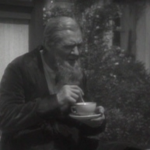 |
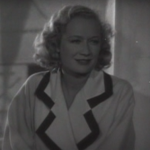 |
 |
| Grandpa Store Lionel Barrymore |
Louise Store Miriam Hopkins |
Guy Franchot Tone |
| Released by MGM | Directed By King Vidor |
||
Proof That It’s Pre-Code
- Louise has a strong arm from “lifting highballs.”
- “Tell the story about the Turk and his harem. That should give you an idea…”
- A woman is separated from her husband.
- You have to drink to the bottom of a jug of whiskey to get to the cusses.
The Stranger’s Return: The Land Beckons
“The world is full of big and little people, Louise. And Guy isn’t one of the little ones.”
I come from farming stock. Well, and teaching stock, insurance salesman stock, and drinker stock, but the farming bit is most definitely in there. The summers of my childhood were spent back in Maryland on the family farm, playing in the field, swinging in the hammock and stomping on flowers. I get nostalgic for this from time to time, but, since I can’t keep a flower alive to save my life (stomped or not), I don’t think tilling the soil is for me.
But there is a very real desire in a lot of American literature to return to ‘the simple life’ of farming. Usually this isn’t portrayed by showing off the drudgery and repetition that such lives entail, but that’s not the point. It’s a wonton craving for simplicity.
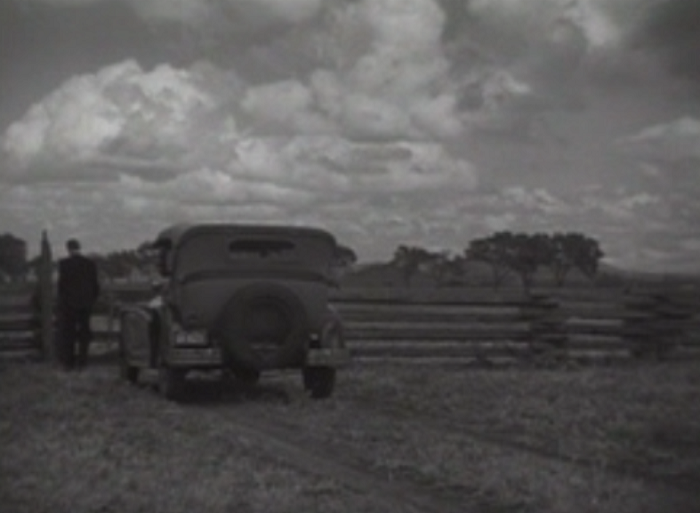
Pictured: the land.
Louise Store (Miriam Hopkins) is a character in desperate need of simplicity. She grew up and lived in New York, but a recent divorce has left her feeling aimless. She returns to Store Haven, the country home of her family where she finds her cantankerous Grandpa still minding the land. He only left the farm once to volunteer for the Civil War.
On the farm are a variety of characters. Grandpa lives with Beatrice, his nephew’s widow, and Thelma, his stepdaughter by his third marriage, and her husband. Beatrice is shrill and manipulative– one of those old ladies who talks behind your back even when she has nothing to say. There’s also Simon (Stuart Erwin), Grandpa’s confidant who lives a “shameless life of lechery and corn whiskey.” Simon tries to shape up when he sees the beautiful Louise step off the train, but he’s a creature of habit– or, addiction, one may say.
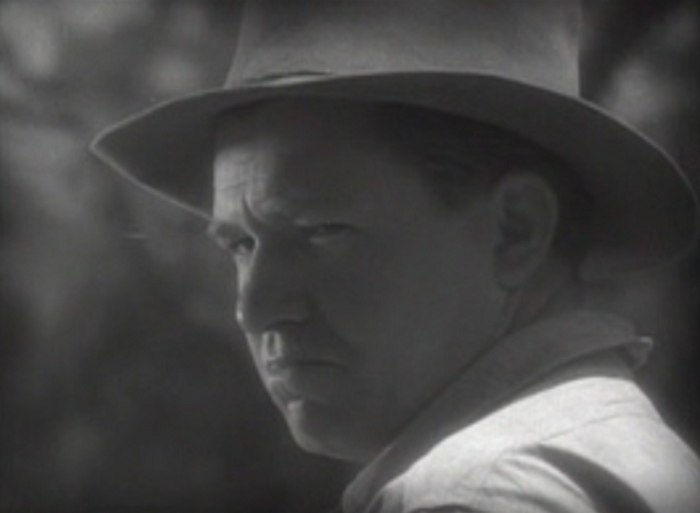
Stuart Erwin yearning for more whiskey.
Simon’s appearance in The Stranger’s Return speaks to the film’s complexity. Simon isn’t a romantic interest for Louise, but an observer, a man whose life is crippled by his weakness for whiskey. Though he’s a comedic drunk in a small sense, what mostly registers is Grandpa’s disgust with him. Simon’s life is a waste, and while he may be a good guy with a healthy dash of loyalty, he’s trapped in a life of menial labor and disrespect because of his addiction.
Grandpa’s role is probably less complicated; Barrymore clearly relishes the chance to play a sweeter version of ‘crotchety’, and takes the opportunity to spend much of the movie hamming it up. Luckily, Barrymore has an innate charm that is impossible to dial down, so even if he started doing naked burpies for a five minute stretch, he would still manage to gain the audience’s sympathy in time for the third act.
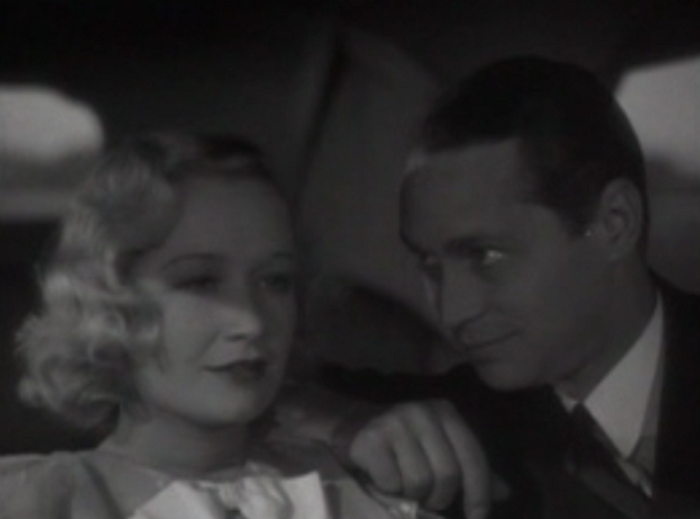
Don’t be palpable.
Louise’s search for simplicity isn’t easy. She meets Guy, one of Store Haven’s neighbors and an accomplished farmer. He had gone to college and proved to be an intelligent agricultural analyst. When Guy returned to the family farm, he found a simple childhood sweetheart and a life he enjoyed but didn’t find fulfilling. City girl Louise fits him better, and it doesn’t hurt that she looks like Miriam Hopkins. But Guy isn’t dumb, and his wife, Nettie, isn’t a nag. He has a good family and a good life, and he would lose a lot to consummate his new found passion. Louise has less to lose, especially as a divorcee– they have a reputation, you know– but she still aches with desires for things she can’t quite articulate.
A lot of the film feels like a proto-Gone With the Wind. While Franchot Tone is no Clark Gable (as I’m sure Joan Crawford would attest), it’s very much devoted to the idea of land, of the beauty of owning and taming wide open spaces. A certain amount of rugged self sufficiency drives this desire, as well as a sense of ancestral obligation. When Grandpa takes Louise out to look at the land that has been her family’s home for three generations, even if all we’re seeing is Lionel Barrymore and Miriam Hopkins’ backs and a couple of trees, it’s all too easy to feel the desire reverberate from the screen.
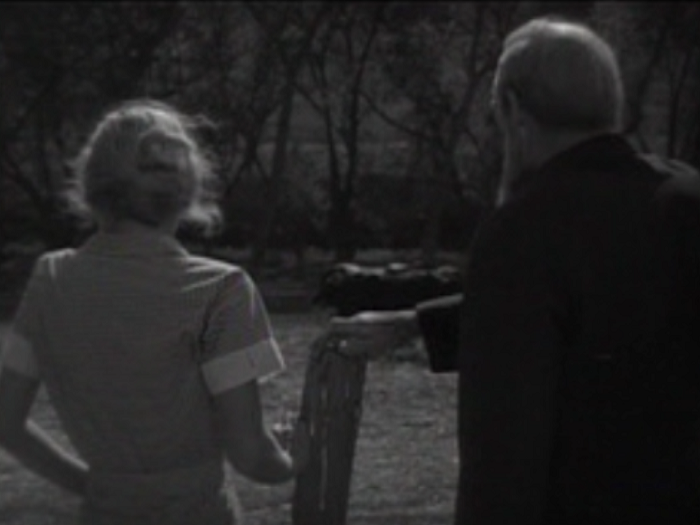
More of the land.
All of this sits ably on Miriam Hopkins’ shoulders. Her ability to convey deep, provocative yearning serves her well here, as much of Louise’s past remains in ellipses. The audience probably knows less than an inkling of her former wife– her ex-husband doesn’t even get named– but we can understand everything that flits across her brain. One scene sees her in a hammock under the aegis of a weeping willow, starring off into space as Guy professes his love. Just that starring allows you to see her gears moving, and trusts so much in an actresses ability that it’s deeply fascinating to watch. None of the decisions that Louise make in the film are easy, and Hopkins with director King Vidor’s help guides the audience to understanding Louise without any monologues or direct needling.
But it would be a mistake to label The Stranger’s Return as a completely pastoral ode. The character of Guy is an interesting departure. While tradition dictates that he should love the farm life, the truth is that Louise reawakens in him his desire for the city life, a desire to do big things in the world and not be entirely tied down by tradition. In seeing these two characters diverge, it’s telling not so much about the superiority of the land, but how a person must do something once they know in their bones its the right thing to do. It’s about finding the best way to apply yourself, even if that means a bit of pain along the way.
It’s hard not to enjoy The Stranger’s Return as an adult drama, an examination of conflicting desires that tug at everyone. Every character in the movie takes their time to think and examine their lives. It reminded me a lot of William Wellman’s So Big!, another movie about the lure of the countryside. While I still prefer So Big!, The Stranger’s Return is a solid, intelligent piece.
Gallery
Hover over for controls.
Trivia & Links
- Ethel Barrymore gets a namedrop, which is amusing since the movie stars her brother. As you may have noticed.
- Greenbriar Picture Show calls this picture’s obscurity a fascinating story in itself and describes the history of its rarity.
There’s also importance of food to these people. They eat, and talk a lot of eating. Lionel is served cereal, “cardboard” according to him, at breakfast (for Grandpa’s health) and rebels by going outdoors to collect eggs and do ritual of frying these plus bacon in extended action where we can almost taste result. He later balks at lemonade and cookies served by neighbor Franchot Tone and wife because they’ll “spoil our lunch,” while his threshing crew after a morning’s work rushes to table like starved animals. Their attack on loaded plates seem like comedy to sedentary moderns who’ve lost sight of what it is to be really hungry after honest-to-goodness work outdoors. Stranger’s extended feast with Miriam Hopkins unable to keep pace with demand for seconds, salt, and what-not, is a highlight that’s staged beautifully by director Vidor.
- Doctor Macro has a cool still and some posters available.
- A thread over at Nitrateville debates the film’s ending. I liked this post from Mike Gerbert:
This is what I love about the movie– they don’t get what they want, they get what they should want, what they know is best, and they’re mature enough to accept that and that in the long run, it will work out. That there are things that are bigger than they are, frankly.
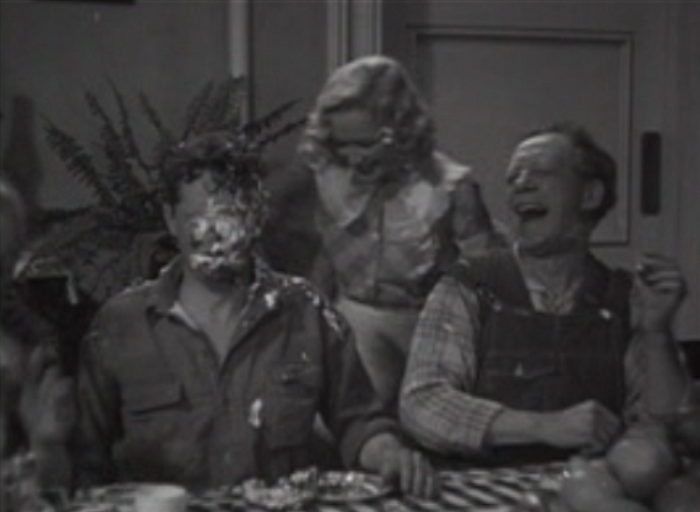
A pie in the face makes everything better.
- A poster also quoted Leonard Maltin talking about encouraging TCM to clear the rights to the picture and what that entailed, as well as the missing ending:
Then came an especially satisfying experience. Several months ago, TCM’s Senior Vice President of Programming, Charlie Tabesh asked me if I had any rare or unusual films to recommend for the festival. I named The Stranger’s Return (1933), which is arguably King Vidor’s least-known movie—yet one of his best. Miriam Hopkins, Lionel Barrymore, and Franchot Tone star in this surprisingly mature film about a divorced woman from New York City who travels to her family’s farm for the first time, in search of her roots. I saw it decades ago when William K. Everson screened a 16mm print and fell in love with it then. Vidor never mentioned it in his autobiography, and I wonder if its commercial failure led him to make his next film (the ambitious Our Daily Bread) away from the studio system.
The Stranger’s Return has been out of circulation because MGM didn’t renew its rights to the original story, by Philip Stong, the man who wrote State Fair. At Charlie’s urging, Warner Bros. got to work and cleared the rights. But another challenge presented itself: when I borrowed the 35mm vault print from MGM for a showing at the Denver Film Festival some time back, there was a jump cut in the final scene. This was not so easily resolved. A fire long ago at the George Eastman House destroyed the original camera negative, so we had to use the same 35mm print—possibly the only one extant. Fortunately, I was able to consult the original editor’s cutting continuity and learned that the missing footage was brief and didn’t affect or alter the conclusion of the story. Whew! (I wasn’t able to stay for the showing, but the next day several people stopped me on Hollywood Boulevard to say how much they liked it. I’m hopeful that TCM will assemble a complete print, using surviving 16mm footage, and present it to an even wider audience on their network.)
Awards, Accolades & Availability
- This film is an obscure one, though having played on TCM back in October I managed to get a copy from Cliff at Immortal Ephemera. Thanks, Cliff!
Comment below or join our email subscription list on the sidebar! |
||
 |
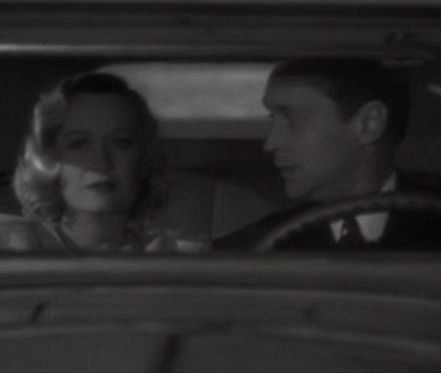 |
 |
 |
 |
|




5 Comments
Gretchen Young · January 20, 2015 at 6:38 pm
Seen this, and thoroughly enjoyed it (on TCM I think it was). Lionel Barrymore is so good, and MIriam Hopkins is good here too, and the relationship she develops with Guy is interesting. And the simplicity of their country lives versus the complexity of their relationships. Fascinating.
Danny · January 21, 2015 at 8:44 pm
Well put!
Judy · January 23, 2015 at 5:27 pm
I’d love to see this one, especially given your ‘So Big’ comparison. Have just read another review of it posted during the Miriam Hopkins blogathon… the combination of Hopkins and Lionel Barrymore sounds irresistible. Will keep my eyes peeled! Surely with Vidor as director and such a cast it must be in line for a DVD release… here’s hoping, anyway. Great piece, as usual.
Patricia · January 29, 2015 at 2:47 am
I saw this film a while ago, and was very impressed with it. I’m not, by and large, a Miriam Hopkins fan, but she is wonderful in this. Thanks for the review!
Danny · January 30, 2015 at 11:56 pm
Not a Hopkins fan? That’s blasphemy in these parts! But she is indeed great in The Stranger’s Return — she reaches for something ethereal with her performance and knocks it out of the park. Glad you liked it!
Comments are closed.